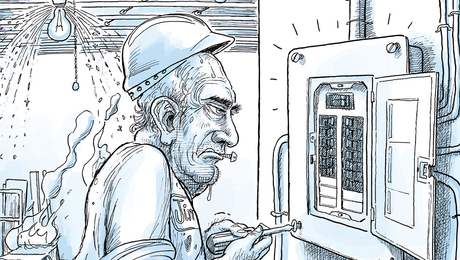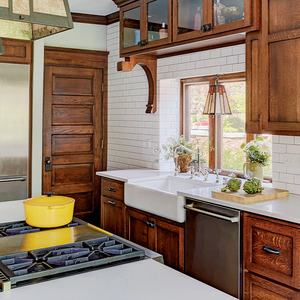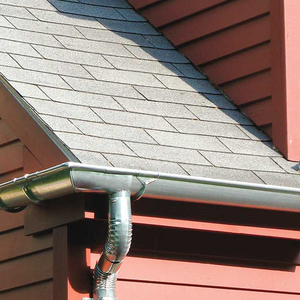I’ve got a small remodeling company in Seattle and we’re hiring our first union residential carpenter. I’d appreciate any feedback on owner’s experience working with residential carpenters union. Thanks.
Discussion Forum
Discussion Forum
Up Next
Video Shorts
Featured Story

Dangerous electrical work and widespread misconceptions cause fires, deaths, and $1.5 billion in property damage annually.
Highlights
"I have learned so much thanks to the searchable articles on the FHB website. I can confidently say that I expect to be a life-long subscriber." - M.K.
Fine Homebuilding Magazine
- Home Group
- Antique Trader
- Arts & Crafts Homes
- Bank Note Reporter
- Cabin Life
- Cuisine at Home
- Fine Gardening
- Fine Woodworking
- Green Building Advisor
- Garden Gate
- Horticulture
- Keep Craft Alive
- Log Home Living
- Military Trader/Vehicles
- Numismatic News
- Numismaster
- Old Cars Weekly
- Old House Journal
- Period Homes
- Popular Woodworking
- Script
- ShopNotes
- Sports Collectors Digest
- Threads
- Timber Home Living
- Traditional Building
- Woodsmith
- World Coin News
- Writer's Digest


















Replies
Don't sign any agreements with the union. As a former union carpenter, I'd advise any small contractor to avoid involvement with the union.
I mean...do you want to marry someone that you can't divorce...and then find out that all the sweet talk was so much BS.
Seriously, getting involved with the union as a remodeling contractor is a mistake, unless and until your business is so big that you have no other choice. And I wouldn't let my business get that big.
I would certainly think twice (or three times) before I did that. I don't know how things work in Seattle, but you may get yourself into a situation where you can't hire anyone who isn't union. (Have you heard about letting the camel get his nose under the tent flap? - lol) You might even have to join the union yourself if you plan to actually do any work other than be the boss.
Why are you hiring a union guy, anyway? If he's somebody you just gotta have, offer him a package that will tempt him away from the union
Around here....
A union member can't work for a non-union shop without serious consequences.
A non-union contractor can't hire a union member without first becoming a union contractor.
A union contractor can't employ non-union workers.
Your current employees will be required to become union members. Every hall is different as to how that is done.
A small contractor may have a real hard time with benefit package payments to the union hall, and if you are late with those payments, then there are fines and penalties.
The big advantage to go union from the employers' point of view is ready access to manpower without obligations to keep those needed employees on the payroll when the job crunch is done. Being a union contractor may also open doors to a different project market.
Lots of luck.
Edited 6/13/2007 6:03 am ET by danski0224
Another big problem is work rules.A friend of mine has a small company that generically does "tennant" finishes. But he does a lot of different things from DW, to studs, to trim, to Dryvit.He said that the unions where trying to get him to sign up and he was willing to join. But he would have to have been in 3 or 4 differnt trade unions and have employes in each of them.Don't see how a small remodeling contractor could ever do that unless there was a combined "builders trade" union..
.
A-holes. Hey every group has to have one. And I have been elected to be the one. I should make that my tagline.
The decision to become a union contractor, which as others have said is generally prerequisite to hiring union carpenters, should not be taken lightly. Very often the change in operations is very hard for a non union contractor to adjust to and has caused many to go under. You have to adjust to the work rules, to the attitude issues of the workers, the stricter accounting practices required as well as the generally higher wages and benefits which you as a small contractor will have no say over negotiating. Don't know about the Seattle area but where I operated as a union contractor for over 20 years (central Illinois) there is currently very little residential work done by union contractors. Generally this is due to being non competitive based on the wage and benefit package union contractors pay their employees. Residential union work has been on a down ward spiral for years, to the point that among union carpenters the only ones that are good residential carpenters are the older ones and those that were non union residential carpenters before they were taken into the union.
Your post was rather brief but if you are being required to do a project with union carpenters in order to get the job the carpenter unions in my area would often do what is called a project agreement. This is specific to a single project and does not require you to sign a contract committing you to becoming a union contractor for all your projects. I hated this as a union contractor as it was IMO screwing the union contractors. The down side for anyone signing this type of agreement is that you will get the dregs of the hall.
Don't know about the Seattle area but where I operated as a union contractor for over 20 years (central Illinois) there is currently very little residential work done by union contractors. Generally this is due to being non competitive based on the wage and benefit package union contractors pay their employees.
The UBC&JofAmerica had/has a program in place to split residential work from commercial. My old local was asked to vote on having a separate, lower pay, contract for residential work about fifteen years ago and, after a brief discussion at our monthly meeting, we voted in down, pretty emphatically.
The main reason for our position was that the wages were only about 2/3rds of what we were making on our commercial work. Many of us were very capable framers and trimmers but no one was willing to take a big cut in pay.
The union's POV was that we should go along with their proposal so that we could reclaim residential work in our area, and then re-negotiate the contract to get the higher rate. Knowing the local housing market made us better able to appreciate how well that wouldn't work.
Apparently they've decided to start new locals, just for residential work. Who knows, it may be a good thing for everyone but not if it's the same old, same old from the union.
Our local had a separate residential contract: Wages that were 70% of commercial scale, benefits were just a little less than commercial. Still could not compete head to head with a non union outfit. The unions looked the other way and allowed the use of some non union subs and we still couldn't compete. Of late, the cost of the benefit package was close to what the average non union outfits were paying for wages. Personally, I didn't (don't) have the temperament to deal with homeowners and so always gravitated to commercial and institutional work. In my area, when I started contracting in the early 80's this work was almost totally Union, this work is now being increasingly done by non union contractors including some who were union and left when their contracts expired or started new companies. Thus they had the experience and understood the quirks of competing in this market. This leaves the union contractors fighting over a declining size market (prevailing wage work), not much fun in that.
Yep, it's really sad how unions have struggled and lost so much. I've always believed that it's public perception of unions which makes them vulnerable. If the AFL-CIO would spend some money on TV ads, explaining the benefits of union membership, they might be able to overcome many of the objections which uninitiated people have about them.
Edit: That and the members must elect honest representatives at the local level.
Edited 6/13/2007 7:52 pm ET by Hudson Valley Carpenter
Don't know about the Seattle area but where I operated as a union contractor for over 20 years (central Illinois) there is currently very little residential work done by union contractors. Generally this is due to being non competitive based on the wage and benefit package union contractors pay their employees.
Funny how the retail prices for union built vs non-union built are the same, though....